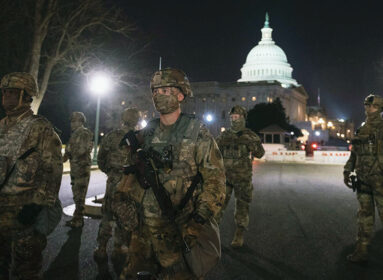
By Cindy Mindell
FAIRFIELD COUNTY — Among the alphabet soup of national and international Jewish organizations that have boasted Connecticut chapters is the American Jewish Committee. Not to be confused with American Jewish Congress – which shares the acronym and also once had a presence here – the American Jewish Committee (AJC) used to support chapters in the Bridgeport, Hartford, and Stamford areas, now all defunct.
The national organization was established in 1906 to safeguard the welfare and security of Jews worldwide. One of the oldest Jewish advocacy organizations in the U.S., AJC was described in the New York Times 25 years ago as “widely regarded as the dean of American Jewish organizations.” With offices across the country and around the world, and through partnerships with Jewish communities and organizations worldwide, AJC works to enhance the wellbeing of the Jewish people and to advance human rights and democratic values for all people. The organization is perhaps best known for its focus on global diplomacy, legislative advocacy, and interreligious/intergroup coalition-building.
AJC’s departure some five years ago, from its last Connecticut stronghold in Stamford, left a vacuum, judging from the response to recent efforts by the Westchester Regional Office to revive a presence in neighboring Fairfield County. Engagement has increased so much in the Greenwich and Stamford Jewish communities that the regional office officially changed its name last month to AJC Westchester/Fairfield.
The shidduch began in 2011, when AJC Westchester brought National Executive Director David Harris to speak at Temple Sholom in Greenwich, at the invitation of the congregation’s spiritual leader, Rabbi Mitch Hurvitz. The rabbi had learned about AJC just a year before from Dr. Elliott Rose, then incoming president of AJC Westchester, when the two met on a UJA-Federation of New York mission to Cuba. Long involved in interfaith work, Hurvitz and his congregation soon began participating in and co-sponsoring the office’s Interreligious & Intergroup Relations Committee activities, including the annual Thanksgiving Diversity Breakfast.
What resonated most among those early audience members was AJC’s emphasis on global diplomacy, says Vicki Kline, AJC Westchester/Fairfield director of development. So the regional office organized parlor meetings in Greenwich featuring the Canadian and Czech Republic ambassadors to the UN, and with the director of AJC’s Paris office.
“AJC is a Jewish organization that offers something that wasn’t available in the community before,” says Kline. “Our diplomatic work struck people because they hadn’t been exposed to that from other organizations before.”
Activity and participation have grown since then and expanded into Stamford, largely thanks to Rabbi Daniel Cohen of Congregation Agudath Sholom and Rabbi Joshua Hammerman of Temple Beth El. A Connecticut committee of 25 members from the two communities help plan programming, led by chair Mona Abramson, former executive director of UJA Federation of Greenwich. Seven members on the Westchester/Fairfield board are Connecticut residents.
Cohen was introduced locally to AJC by Harriet Schleifer, the sister of a congregant, who is a member of the Westchester/Fairfield board and national board of governors. It was when he attended the organization’s annual Global Forum in Washington, D.C. that he understood what AJC does. Since then, he has encouraged his congregation to learn more about the organization.
“I’ve never been to a conference before where I’m meeting representatives of European governments who have come to learn about the Jewish people,” he says. “I was sitting at dinner with a fellow who works at the French embassy in Boston, and we were chatting about what’s going on in the French Jewish community. This is a unique opportunity to talk to people from other countries about what we can do together to amplify good and truth, and to work with AJC leaders from South America and Europe on creating more ties with Israel and support for the Jewish communities in those countries.”
When Hurvitz was honored at AJC Westchester’s annual gala in May, “that was a turning point for us,” says regional office director Scott Richman. “It’s one thing to do programming in Fairfield County, but the decision by the gala committee to honor somebody from Connecticut and someone who helped us get into Connecticut – that told us that we’d really achieved something.”
One-third of the event attendees crossed the border from Connecticut. Five months later, AJC had lined up the consul for political and scientific development for the Consulate General of the Federal Republic of Germany in New York as the keynote speaker during afternoon Yom Kippur services at Temple Sholom in Greenwich. Kline says that it was “embarrassing” at that point to present AJC with only its Westchester moniker. The Westchester board confirmed a name change and Hurvitz announced it before the consul took the bimah. At its meeting in Los Angeles late last month, AJC’s national Board of Governors ratified the name.
Beyond programming related to global diplomacy, AJC has begun to engage Connecticut communities in other ways, partnering with the Jewish Arts and Film Festival of Fairfield County on a Yom Hashoah program featuring Israeli filmmaker David Fisher and a discussion on the vibrant film industry in Israel. Connecticut committee members have participated in briefings with Sen. Chris Murphy and Rep. Jim Himes on issues including Israeli security, Iran’s nuclear program, and immigration reform.
AJC is unique, according to Hurvitz, “because it’s both Jewish-centric and interfaith-centric.”
“It’s very Zionist-oriented, with a consistent, Zionist and pluralist message,” he says. “It’s very community-minded, seeking collaborative partnerships with other Jewish organizations. People can get that from other organizations but not quite in as ‘smorgasbord’ a way,” he says. “If you’re into the interfaith part of the dialog, they offer it. If you’re into the Israel side, you can get involved in that. If you want to raise Jewish concerns in an international arena with government leaders, they have that too.”
Cohen sees AJC’s emphasis on relationship-building as one of its core strengths and draws. “There are many rational, sane, supportive voices in government and in different important constituencies,” he says. “ADL fights antisemitism and bias, but is mostly focused in America, as I see it. AIPAC is very clearly focused on America-Israel relationships. Like AIPAC’s work in Congress, it’s through personal relationships and getting engaged that we can have an influence. AJC is about global Jewish advocacy, not just Israel. They work to build support and understanding for Jewish communities throughout the world. Within the context of anti-Semitism and uncertainty for Jews, it is very important to build as many relationships as we can in the broader community.”
Cohen says that more of his congregants now understand what AJC is about and the importance of its global reach.
“All involvement in Jewish organizations stems from a very strong desire in our congregation to advocate for Israel and the Jewish people and to make a difference,” he says. “We all have to be ambassadors, working together to make the world a better place and show how the Jewish people can be a light in the world. In the Torah, God tells Avraham, ‘You should be a blessing,’ but that means not solely while functioning within his own community and world. You have to get out there and AJC is a way to do that.”
CAP: Scott Richman, AJC Westchester/Fairfield regional director (far left), travelled to Israel last month with eight New York-based diplomats for a week of high level meetings and briefings, as well as visits to Tel Aviv, Ramallah, Jerusalem and the southern part of the country affected by the recent Gaza conflict. Scott Richman, AJC Westchester/Fairfield regional director (far left), travelled to Israel last month with eight New York-based diplomats for a week of high level meetings and briefings, as well as visits to Tel Aviv, Ramallah, Jerusalem and the southern part of the country affected by the recent Gaza conflict.








 Southern New England Jewish Ledger
Southern New England Jewish Ledger









